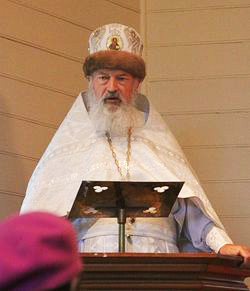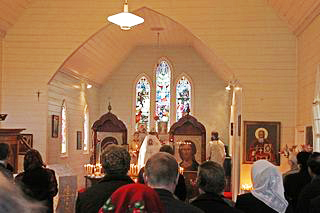Warrnambool, Australia � On the Sunday of the Holy Fathers of the 1st Ecumenical Council, the Russian Orthodox community in the Australian city of Warrnambool celebrated their Parish feast day and a 10-year jubilee since the day the parish was converted from a historical Anglican Church to a thriving Russian Orthodox Parish. In mark of this event, Protopriest Michael Protopopov gives an interview to www.pravoslavie.ru to discuss the reasons why Catholics, Protestants and Anglicans are deserting their churches.
Is the conversion of the Anglican church in Warrnambool to a Russian Orthodox church an isolated case?
 No; for the Russian Orthodox Diaspora, as for the Serbs, Greeks, Romanians, Bulgarians, and Macedonians, the practice of acquiring abandoned non-Orthodox places of worship and converting them into functioning Orthodox churches was quite common in the 20th century.
No; for the Russian Orthodox Diaspora, as for the Serbs, Greeks, Romanians, Bulgarians, and Macedonians, the practice of acquiring abandoned non-Orthodox places of worship and converting them into functioning Orthodox churches was quite common in the 20th century.
Almost all of our Russian Orthodox Parishes in Australia were formed out of abandoned churches before the Russian communities had the material and financial capabilities to build their own Russian Orthodox churches. In the cities of Adelaide, Perth and Brisbane, Russian Orthodox parishes were formed out of empty Anglican churches, and the same thing happened in Tasmania. Although in Sydney the first Russian Orthodox parish was a converted house church, some of the other Sydney parishes grew out of non-Orthodox church buildings.
How did the non-Orthodox Christian communities receive the newly-arrived Russian Orthodox Diaspora?
The Anglicans have been very helpful to the Russian Orthodox ever since we arrived in Australia in the 1920�s. In the early 1920�s and throughout the 20th century many influential Anglican priests were strong anti-communists, so there was always common ground to be found between the ROCOR and the local Christian churches.
These days we don�t have any ties with either the Anglicans or the Catholics, because they have moved so far from everything that somehow used to unite us in the past. We don�t have anything to do with the Catholics or the Anglicans anymore except for acquiring their discarded places of worship.
During the 1920�s, the Anglicans were writing the New Book of Common Prayer; it was very Orthodox in its approach. Metropolitan Anthony Khrapovitsky of blessed memory had even said that if the Anglicans were to accept the New Book of Common Prayer there would be very little separating the Orthodox and the Anglicans, and perhaps they could even be recognized as equal to ourselves. Unfortunately, they never did accept the New Book of Common Prayer, and therefore the unity between the two Churches never went ahead. However, the Anglicans still retained a great fondness for the Orthodox and supported us all the way through until Warrnambool 10 years ago.
As�a case study, describe the process in Warrnambool for the conversion of the Anglican church building?
 When we first opened a Russian Orthodox mission in Warrnambool we began by renting an abandoned Catholic church. After 12 months the local Anglican Diocese approached us, offering up their place of worship. The Anglican Diocese ruled that it was no longer viable to maintain a functioning church since the great decline in parishioners. This decline was mainly because of modern innovations like women clergy, etc. After some negotiations the Anglican diocese was very glad for us to take the church.
When we first opened a Russian Orthodox mission in Warrnambool we began by renting an abandoned Catholic church. After 12 months the local Anglican Diocese approached us, offering up their place of worship. The Anglican Diocese ruled that it was no longer viable to maintain a functioning church since the great decline in parishioners. This decline was mainly because of modern innovations like women clergy, etc. After some negotiations the Anglican diocese was very glad for us to take the church.
For the Anglicans and Catholics is the crisis in the closure of churches restricted to rural areas, or has it spread to the cities?
I�would say that their problem is not restricted to rural areas, but also exists in major cities. The Protection of the Holy Virgin Cathedral in Collingwood, Melbourne, was once a thriving Presbyterian Cathedral, and was given over to the Russian Orthodox Church Outside of Russia due to a lack of faithful. The sale of church property on a gargantuan scale is an indication of the fact the Australian populace is living in a post-Christian age. More and more people are becoming secular as opposed to being religious and spiritual. Fifty years ago, the Australian populace was much more religious; the Catholic Church has begun to recede dramatically since the Second Vatican Council of 1963. Likewise the Anglican Church has seen plummeting parishioner numbers since the introduction of homosexuality as not a ban to clergy, same-sex marriages, female clergy and even female bishops.
The closure of Anglican, Protestant and Catholic churches in rural and populated areas is also due to the fact that they lack priests, nuns and seminarians. People have lost commitment.
Especially Catholics aren�t committed as they were before the Second Vatican Council of 1963. Those people that were once committed, those people who founded these churches, have wandered away from the Catholic Church, and their children have perhaps grown up not knowing Christianity at all. Thus, out of the youth there are hardly any candidates for seminary or monasticism. Without a solid seminary and monastic program, the Catholic Church can hardly expect a positive future.
It is quite sad that Catholic and Anglican churches are being abandoned and sold. For example, at the Russian Orthodox parish in Warrnambool, there are beautiful, old stained glass windows which have inscriptions in memory of the founders of the church, brass candle sticks which have engraved in them names of parishioners who are now forgotten by their own people. Those parishioners and founders of the church are remembered in our prayers during every liturgy�as is standard practice in the Orthodox Church to pray for the �founders of this holy temple.�
In comparison to the saddening situation of the Catholic, Anglican and Protestant Churches in Australia, how does the Orthodox Church rate?
The Orthodox churches in Australia have seen massive growth throughout the twentieth century. There are 500,000 Greek Orthodox in Australia�they are the largest Orthodox group. The Russian Orthodox Community is also growing. There are now 200,000 Russians in Australia according to the official census�of whom 150,000 are Orthodox. Such growth is also prevalent in other Orthodox denominations�Greeks, Serbs, Bulgarians, Romanians and Macedonians.
Recently, non-Orthodox Christian denominations have begun engaging in the modernization of church policy, prayer, liturgics, missionary work, and church practice. If we compare the traditionalism of the Russian Orthodox Church with the radical changes in those non-Orthodox Christian denominations, the statistics suggest that those radical changes are at the least unnecessary, and perhaps harmful.
I think that many people see constancy in the Orthodox Church, they see spirituality; and they see the fact that we are not changing our rules, but rather changing ourselves to live by the rules. This is a very positive thing�people like stability, they like to retain what they believe in, and they regard tradition as a very important aspect of religion. Thus the Orthodox Church is becoming quite popular, whereas other Christian churches are losing people. They are losing people because their Church has lost its spirituality on an official level. Many Christian Churches have lost their identity, they have no theology; all they have now is a social-welfare type of agenda, and that doesn�t suit everybody.
Does the Russian Orthodox Church engage in the sale of Church property when parish numbers are low?
Throughout ROCOR, at the beginning of the formation of Russian Orthodox communities, often small, temporary house churches would be built until a proper, more functional and traditional church building could be built. Even those small temporary house churches were never sold or closed; to the contrary, they were renovated and refurnished constantly and survive till this day. For example, St. Vladimir�s Church�the first Russian Orthodox Church in Sydney�started as a humble house church. But after ongoing renovations, it boasts cupolas and a magnificently decorated interior.
We Russian Orthodox have a different mindset; we understand the sanctity of a church. Unfortunately, I believe that in the Anglican Church fewer and fewer people are of this mindset. Non-Orthodox Christian denominations even sell their churches as restaurants, bars and other secular purposes. In the city of Melbourne there is a restaurant called �Chapel on Chapel,� and this bar was an Anglican Chapel on Chapel Street in the suburb of South Yarra. There have even been instances were non-Orthodox Christian denominations have converted beautiful old sandstone cathedrals into apartments, theatres, and bars.
Simeon Boikov, Moscow June 2009